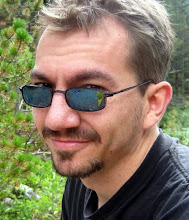Whatever your feelings on the Iraq war, I think it is important to remember the costs of such endeavors.
The premature death of Joseph Dwyer at the age of 31 has highlighted the neglect many American veterans believe they face once they return home.
He was made famous by a photograph, taken in March 2003 during the first week of the war, in which he is seen running to a makeshift hospital.
In his arms, the soldier was cradling an injured Iraqi boy who he had rescued from crossfire.
The arresting image, held up by the war's supporters as the human face of the invasion, was reproduced around the world and Specialist Dwyer was hailed as a hero.
However, he was always uncomfortable with the media attention, attempting to deflect its focus on to his entire unit. He had done no more than any of the other soldiers in his unit, he told reporters.
It emerged that Mr Dwyer's post-war civilian life was also no different to that of many fellow veterans.
For years, he struggled against post-traumatic stress disorder (PTSD), drug abuse, unemployment and marital breakdown.
On June 28, Mr Dwyer, 31, called a taxi to take him to a hospital near his home in Pinehurst, North Carolina, after earlier taking presciption pills and inhaling fumes from a computer cleaner aerosol.
When the driver arrived, Mr Dwyer said he was too weak to open the door. Police had to kick it down and found he had collapsed. Within minutes, he had died.
Police in several states had been dealing with Mr Dwyer for several years as he suffered from violent delusions that he was being hunted by Iraqi soldiers.
He was in and out of psychiatric care, once being committed after he started firing at imagined attackers inside his home, leading to a three-hour police siege. He had also crashed his car several times after swerving to avoid imagined roadside bombs.
Mr Dwyer's family said he had also been struggling with depression and sleeplessness, symptoms associated with PTSD. He would spend nights hiding in a wardrobe clutching a knife, and started inhaling from aerosols to help him sleep.
Hat Tip: Rod Dreher




